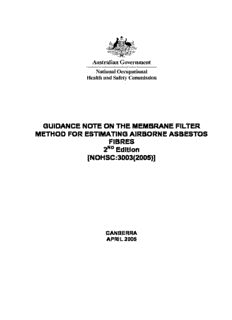
Guidance Note on the Membrane Filter Method for Estimating Airborne Asbestos Dust PDF
Preview Guidance Note on the Membrane Filter Method for Estimating Airborne Asbestos Dust
GUIDANCE NOTE ON THE MEMBRANE FILTER METHOD FOR ESTIMATING AIRBORNE ASBESTOS FIBRES ND 2 Edition [NOHSC:3003(2005)] CANBERRA APRIL 2005 NATIONAL OCCUPATIONAL HEALTH AND SAFETY COMMISSION GUIDANCE NOTE ON THE MEMBRANE FILTER METHOD FOR ESTIMATING AIRBORNE ASBESTOS FIBRES ND 2 Edition [NOHSC:3003(2005)] CANBERRA APRIL 2005 © Commonwealth of Australia 2005 ISBN 1 920763 81 3 This work is copyright. You may download, display, print and reproduce this material in unaltered form only (retaining this notice) for your personal, non-commercial use or use within your organisation. Apart from any use as permitted under the Copyright Act 1968, all other rights are reserved. Requests for further authorisation should be directed to the Commonwealth Copyright Administration, Intellectual Property Branch, Department of Communications, Information Technology and the Arts, GPO Box 2154, Canberra ACT 2601 or by email to: [email protected] Guidance Note on the Membrane Filter Method for Estimating Airborne Asbestos Fibres 2nd Edition [NOHSC:3003(2005)] FOREWORD The National Occupational Health and Safety Commission (NOHSC) leads and coordinates national efforts to prevent workplace deaths, injury and disease in Australia. Through the quality and relevance of the information it provides, the NOHSC seeks to influence the awareness and activities of every person and organisation with a role in improving Australia’s occupational health and safety (OHS) performance. More specifically, the NOHSC aims to: • support and enhance the efforts of the Australian Government and State and Territory governments to improve the prevention of workplace deaths, injury and disease; • work in alliances with others to facilitate the development and implementation of better preventative approaches; and • ensure the needs of small business are integrated into these approaches. The NOHSC’s National OHS Strategy 2002-2012, which was endorsed by the Workplace Relations Ministers’ Council on 24 May 2002, records a commitment by all Australian, State and Territory governments, the Australian Chamber of Commerce and Industry and the Australian Council of Trade Unions to share in the responsibility of ensuring Australia’s performance in work-related health and safety is continuously improved. This National OHS Strategy sets out five ‘national priorities’ to achieve short-term and long- term improvements. These priorities are to: • reduce high incidence and high severity risks; • improve the capacity of business operators and workers to manage OHS effectively; • prevent occupational disease more effectively; • eliminate hazards at the design stage; and • strengthen the capacity of government to influence OHS outcomes. In line with these priorities, the NOHSC declares national guidance materials under section 38 of the National Occupational Health and Safety Commission Act 1985 (Cth). In common with other NOHSC documents, national codes of practice and guidance notes are advisory instruments only, unless they are made mandatory by a law other than the National Occupational Health and Safety Commission Act or by an award or instrument made under such a law. The application of a national code of practice or guidance note in any particular State or Territory is the prerogative of that State or Territory. The Australian Government and the NOHSC expect, however, that national codes of practice and guidance notes will be adopted by all State and Territory governments. iii Guidance Note on the Membrane Filter Method for Estimating Airborne Asbestos Fibres 2nd Edition [NOHSC:3003(2005)] CONTENTS FOREWORD III PREFACE IX PART 1. TITLE 11 PART 2. OBJECTIVE 12 PART 3. SCOPE AND APPLICATION 13 PART 4. DEFINITIONS 15 PART 5. GENERAL METHOD DESCRIPTION 17 PART 6. EXPOSURE MONITORING FOR OCCUPATIONAL SITUATIONS 18 6.1 Strategy for Exposure Monitoring 18 6.2 Total Sample Duration and Number of Samples 18 PART 7. CONTROL MONITORING FOR OTHER SITUATIONS 19 7.1 Strategy for Control Monitoring 19 7.2 Total Sample Duration 20 PART 8. FLOW RATE, SAMPLE VOLUME AND REPORTING 21 8.1 Single Sample Duration 22 8.2 Blanks 23 8.3 Sampling Record 24 PART 9. LIMITATIONS OF THE METHOD AND PRESENTATION OF RESULTS 25 PART 10. LABORATORY TECHNIQUES AND ANALYSIS 27 10.1 Sampling Equipment and Procedures 27 10.1.1 Sampling Pump 27 10.1.2 Filters 27 10.1.3 Filter Holders 28 v National Occupational Health and Safety Commission 10.1.4 Storage and Transport of Samples 28 10.2 Sample Preparation 29 10.2.1 Cleaning Slides and Equipment 29 10.2.2 Filter Sample Cutting 29 10.2.3 Mounting the Sample 29 10.3 Optical Requirements 30 10.3.1 Microscope Equipment 30 10.3.2 Microscope Accessories 31 10.3.3 Microscope Adjustment Principles 31 10.3.4 Eyepiece Graticule Calibration 31 10.3.5 Microscope/Analyst Performance Assessment 32 10.4 Counting and Sizing Fibres 32 10.4.1 Low Power Scanning 32 10.4.2 Graticule Field Selection 32 10.4.3 Laboratory Working Conditions 33 10.4.4 Counting Criteria 33 10.4.5 Blanks 34 10.4.6 Acceptable Fibre Loadings on Filters 34 10.4.6.1 Minimum Loading 34 10.4.6.2 Maximum Loading 34 10.4.7 Calculation of Dust Concentration 35 10.4.7.1 Single Values 35 10.4.7.2 Time Weighted Average Values 35 10.5 Quality Assurance and Quality Control 36 PART 11. SAMPLING AND ANALYTICAL UNCERTAINTY 38 11.1 Sources of uncertainty 38 11.2 Sources of Systematic Errors (bias) 38 11.2.1 Sampling 38 11.2.2 Analytical 38 11.3 Sources of Random Errors 39 11.3.1 Sampling 39 11.3.2 Analytical 39 11.4 Uncertainty 39 APPENDIX A. FLOWRATE CALIBRATION AND CORRECTIONS 41 vi Guidance Note on the Membrane Filter Method for Estimating Airborne Asbestos Fibres 2nd Edition [NOHSC:3003(2005)] APPENDIX B. EXPOSURE MONITORING SAMPLING RECORD (EXAMPLE ONLY) 45 APPENDIX C. SPECIFICATIONS FOR FILTERS, FILTER HOLDERS AND SAMPLING PUMPS 47 APPENDIX D. MEASUREMENT OF EFFECTIVE FILTER AREA 49 APPENDIX E. ACETONE-TRIACETIN MOUNTING PROCEDURE 51 APPENDIX F. DETECTION LIMIT TEST SLIDE 53 APPENDIX G. SPECIFICATIONS FOR EYEPIECE GRATICULE AND CALIBRATION 55 APPENDIX H. MICROSCOPE ADJUSTMENT PROCEDURE 59 APPENDIX I. DRAWINGS OF VARIOUS ASBESTOS FIBRES 61 APPENDIX J. EXAMPLE OF A FIBRE COUNTING RECORD 65 APPENDIX K. UNCERTAINTY 67 vii
Description: